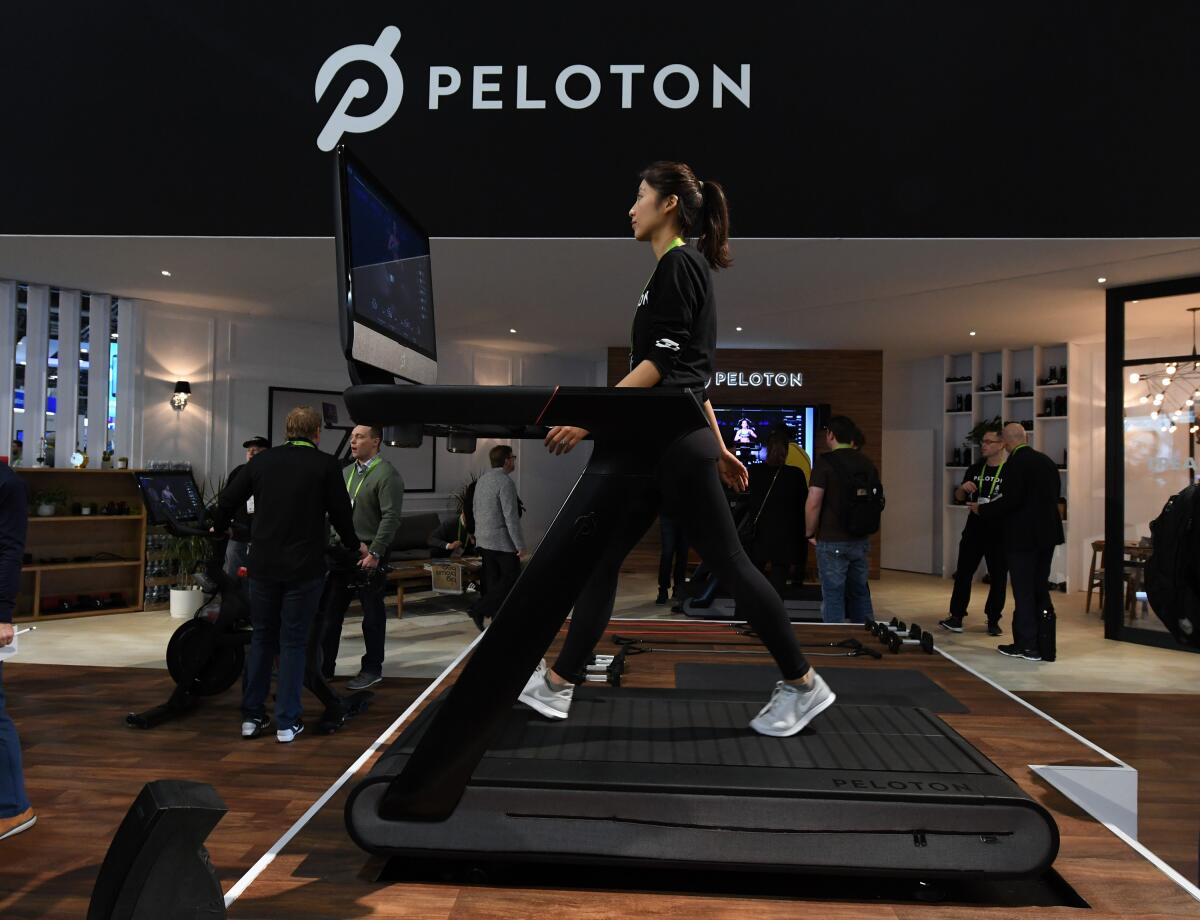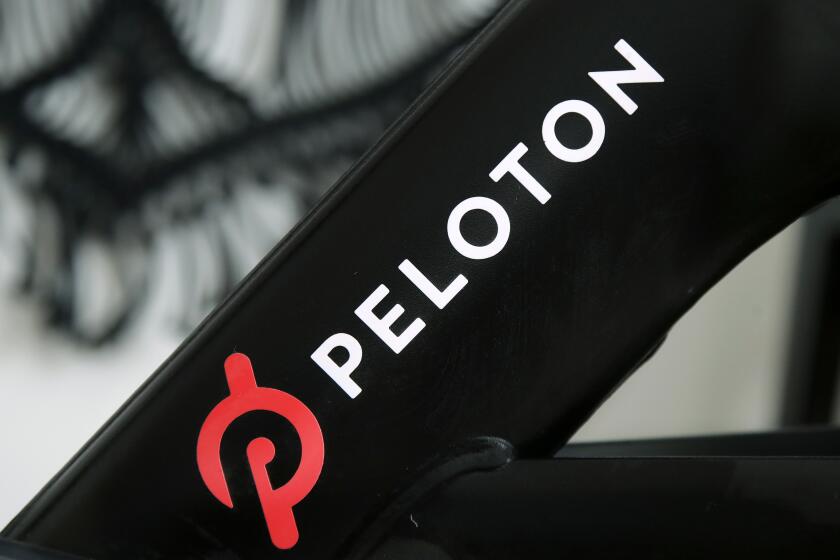Column: Peloton reverses on recall. Hurting kids isn’t a great look

- Share via
Peloton, a fitness-focused company predicated on people’s well-being, has decided it’s not good business to market products that can kill or injure children.
After earlier digging in its heels and refusing to recall its Tread+ exercise machine, which was linked to the death of one child and injuries to dozens more, Peloton now says it will recall the treadmill and expressed remorse about having been so boneheaded in its decision-making.
“I want to be clear, Peloton made a mistake in our initial response to the Consumer Product Safety Commission’s request that we recall the Tread+,” Chief Executive John Foley said in a statement.
“We should have engaged more productively with them from the outset. For that, I apologize.”
File under: Better late than never.
Even so, the episode highlights the challenges that can be faced in persuading a company to do the right thing, particularly when confronted with a recall that could cost it millions of dollars.
Peloton’s Tread+ treadmill has been blamed for the death of one child and injuries to dozens more. The company says it won’t recall the machine.
It also underlines the shortcomings of a federal agency, the Consumer Product Safety Commission, that has relatively little power to force businesses to act when public safety is on the line.
“The CPSC went to Peloton and said there’s a problem and asked what they could do to resolve the problem,” Remington Gregg, a lawyer with the advocacy group Public Citizen, told me. “The company’s response was to tell them to go to hell.”
Peloton’s initial stance was a bit more nuanced than that. But not much.
On April 17, the CPSC issued an “urgent warning” that the Tread+ is dangerous and poses a grave risk to households “after multiple incidents of small children and a pet being injured beneath the machines.”
A hard-to-watch video made the rounds online showing how dangerous the Tread+ can be.
Did Peloton voice concern about the problem or quickly instruct customers to be careful? Nope and nope.
It called the agency’s warning “inaccurate and misleading,” and told customers “there is no reason to stop using the Tread+.”
Foley, the CEO, said separately that the company had “no intention” of recalling the $4,300 treadmill.
Not a great look for a company that wants to improve people’s lives.
“Consumers expect that when a product is unsafe — whether a defect or a manufacturing flaw — that a company will do what is best for the purchasers of the product: Take responsibility, recall the product, refund the cost of the product,” said Rachel Weintraub, legislative director for the Consumer Federation of America.
“This is exactly the opposite of what Peloton did publicly and contradicts consumer expectations,” she told me. “Their reversal shows that ultimately protecting consumers, acknowledging problems and working with the CPSC are the right paths forward for consumers, and ultimately for them.”
Experts in product-safety law were left scratching their heads over Peloton’s intransigence, particularly in the face of almost uniformly bad press.
After a hoverboard burst into flames and “severely burned” a California woman, a court ruling could bring major changes to Amazon and its third-party marketplace.
“Once it became clear that the CPSC was concerned about safety issues with the treadmills, it was unclear why Peloton was so resistant to working with CPSC to resolve the dispute in a manner that would have protected consumers and not resulted in possible reputational damage,” said Carl Tobias, a law professor at the University of Richmond.
“The whole episode may be a signal that the CPSC will vigorously protect consumer safety in the new administration,” he said.
That’s the hope among consumer advocates. As it stands, the CPSC is like a watchdog behind a fence — ready to bark at signs of danger but unable to bite.
The agency has authority to seek mandatory recalls under certain conditions. In practice, however, this hardly ever happens.
Seeking a mandatory recall is a laborious process requiring the CPSC to pursue a court order. This can take years.
Instead, the CPSC relies almost exclusively on persuading companies to implement voluntary recalls. When businesses agree, fine. When they don’t — as was the case with Peloton — federal officials find themselves at a standstill.
The agency can levy fines for violations of reporting requirements. But it was alarmingly reluctant under the previous administration to do so.
As I’ve previously reported, the CPSC has issued just one civil fine so far this year. No fines were issued last year. Two fines were levied in 2019 and one in 2018.
And then there’s 6(b).
Section 6(b) of the Consumer Product Safety Act limits the CPSC’s ability to inform the public about potentially dangerous products.
In effect, it prevents the agency from issuing a warning without the permission of the company involved, although in Peloton’s case it took the rare step of alerting people anyway.
“Peloton finally got the message that it should cooperate, but only because the CPSC went very loud with its public-safety notice and video response to the company’s refusals to act,” said Ed Mierzwinski, senior director of the federal consumer program for the U.S. Public Interest Research Group.
“The Consumer Product Safety Act gives manufacturers too much control over recalls,” he told me.
Fixing that should be a top priority for lawmakers.
After Peloton’s initial refusal to recall the Tread+, Sen. Richard Blumenthal (D-Conn.) introduced legislation that would do away with Section 6(b) and give the CPSC authority to be more proactive in safeguarding the public.
He was joined on the House side by Reps. Jan Schakowsky (D-Ill.) and Bobby L. Rush (D-Ill.).
This is a much-needed amendment to federal product-safety law and should be passed immediately.
Otherwise, it seems inevitable that there will be other Pelotons with other questionable products — and further instances of companies thinking they can get away with self-serving, repulsive behavior.
“This is a cautionary tale,” said Gregg at Public Citizen. “Companies need to work with the agency to address issues.”
And if they won’t, there need to be consequences.
Peloton’s leadership — yes, looking at you, Mr. Foley — proved itself to be irresponsible, hard-hearted and woefully callous when faced with an indisputable safety problem.
I’d be really surprised if the company’s board isn’t now trying to decide if they’ve got the wrong guy pedaling nowhere on the corporate exercise bike.
More to Read
Inside the business of entertainment
The Wide Shot brings you news, analysis and insights on everything from streaming wars to production — and what it all means for the future.
You may occasionally receive promotional content from the Los Angeles Times.












